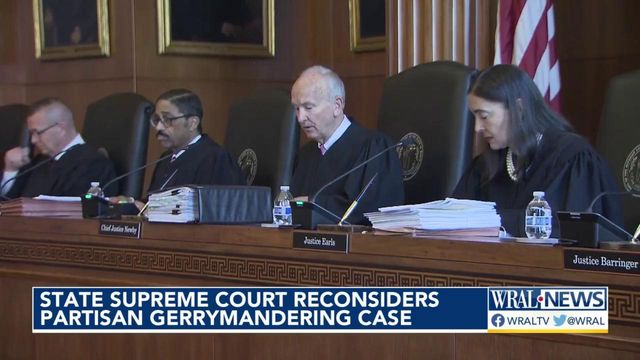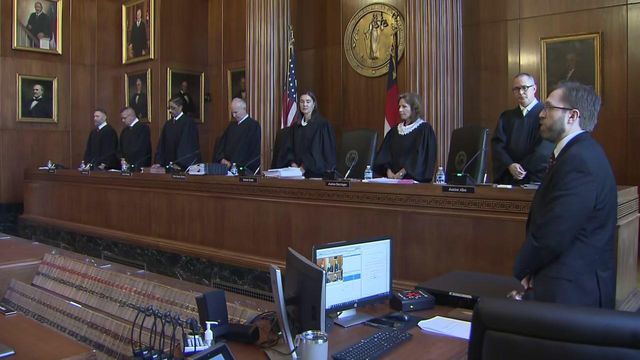NC Supreme Court rehears arguments in controversial redistricting case
North Carolina Supreme Court justices met Tuesday in a rare rehearing of a case that was already decided. It concerns the fairness of voting districts drawn by Republican lawmakers — and a reversal in the court’s opinion could have major ramifications on the 2024 elections, shifting political power to the right on the state and national levels.
Last year the court's Democratic majority struck down new voting districts drawn by Republican lawmakers as unconstitutional gerrymanders. The lines denied North Carolinians the guarantee of free elections by allowing one political party to remain in power, the court’s majority wrote in a first-of-its-kind ruling. The decision to rehear that case came soon after Republicans flipped control of the Supreme Court in the 2022 elections, which has led critics to say the rehearing is based more on politics than any legal grounds.
If Republicans win this time, the case could ultimately leave the party with more power in the General Assembly. Nationally, it could also give Republicans stronger control of the U.S. House of Representatives. The GOP currently controls the chamber by a five-seat majority, giving Democrats hope of retaking the House in 2024. But that’s with North Carolina’s current maps.
Republicans control the state legislature and, as a result, are in charge of drawing the state's voting districts. They're widely expected, if the court allows it, to draw a new map that could give the GOP a 10-4 or even 11-3 edge in the state's 14 congressional districts, instead of the even 7-7 split in the current maps—drawn by outside experts last year, under court order.
Before Tuesday's proceedings, hundreds of people gathered across the street from the court in downtown Raleigh Tuesday, protesting the decision to rehear the case. Their chants could be heard from inside the courtroom at times. Meanwhile, the North Carolina Republican Party came to the defense of its new court majority, saying the justices only acting to correct the wrongs from the original ruling in the case, which came last year when the court had a Democratic majority.
"This case is about righting the egregious wrongs committed by an out of control court and reestablishing the proper constitutional roles of our three branches of government when it comes to legislative redistricting," Michael Whatley, chairman of the state Republican Party, said in a statement.
'Ground zero for control of the House'
Rehearing a case has happened only rarely in state history. Democratic Justice Anita Earls questioned whether the court should really have absolutely no oversight over redistricting, which could happen if the court reverses last year's ruling.
The maps lawmakers originally wanted, before the court ruled them unconstitutional last year, would "ensure that Republicans will retain majorities in North Carolina's Congressional districts and the General Assembly, even when voters really prefer the other party," Earls said.
But one of her new colleagues defended the new majority's controversial choice. Republican Justice Richard Dietz repeatedly suggested that lawyers for the group Common Cause, which was among those challenging the maps, should face official professional sanctions for calling arguments for the rehearing "frivolous."
Adding to the weightiness of the proceedings, all three of the Democrats who represent the Triangle in Congress, U.S. Reps. Valerie Foushee, Deborah Ross and Wiley Nickel, spoke to reporters after the hearing ended. Ross, a civil rights attorney who also attended the hearing in person, said there's a lot of attention on Raleigh nationally.
"North Carolina is ground zero for House control," Ross said. "And we are going to do everything that we can to protect and preserve our gains."
Nickel represents a suburban district south and west of Raleigh that, on paper, he should've narrowly lost in 2022. He said he thinks more districts need to be that competitive — not fewer, as would likely be the case if the court gives state lawmakers carte blanche to redraw the lines ahead of 2024.
"That's what every single district should look like," he said. "One that could go either way. One where the voters are the ones that make a decision and make the choice in this election."
The arguments in court
While the case largely revolves around power in the legislative branch, the politics of the bench have taken center stage in this new rehearing.
"Each and every day this court continues to make more and more clear that it will give in to demands of the Republican-led General Assembly and further enable partisan schemes, regardless of the Constitution or the precedents set before them," said Anderson Clayton, chair of the state Democratic Party, at a press conference after the hearing ended.
During Tuesday's do-over arguments the justices focused on many of the same details they disagreed on between themselves in the court's ruling and dissent last year. Some were technical details, others more philosophical, but all underpinned the basic question of the case: Did Republican politicians violate North Carolina’s constitution by gerrymandering the maps used to elect our state and national lawmakers?
Three of the court's five Republican justices asked no questions Tuesday; most of the work on the GOP side was handled by Chief Justice Paul Newby. Newby also wrote the Republicans' dissent in the case last year, which Republican lawmakers quoted heavily from when they asked the court to rehear the case.
At one point, as an attorney for the challengers was explaining different mathematical ways to judge whether a map is gerrymandered or not, Newby threw his arms up in bewilderment.
"How can you determine that?" he asked, seemingly as unconvinced Tuesday that gerrymandering is a matter for the courts as he was last year.
Evidence from the trial in early 2022 showed that, out of the trillions of possible ways to divide North Carolina into political districts, every map the legislature proposed was more skewed in favor of Republican candidates than 99.9% of the possible versions. That included maps for the state House and Senate, as well as for North Carolina’s 14 seats in the U.S. House of Representatives.
Republicans argued last year, and again Tuesday, that they’re free to draw the lines however they want.
The state constitution gives the legislature control over redistricting, with no explicit rules on what is or isn’t allowed.
The Supreme Court said that doesn’t mean the legislature is immune from judicial oversight. While the state constitution does give the legislature control over redistricting, the justices ruled last year, the constitution also guarantees that “all elections shall be free.”
If the outcome of an election is largely predetermined by the shape of the districts, it’s not really a free election, the court ruled last year. For example, the maps GOP lawmakers wanted for themselves would’ve essentially guaranteed Republicans to keep control of the state legislature in future elections, as well as most Congressional seats, even if most voters voted for Democratic candidates instead.
Phil Strach, a lawyer for the legislature, said state lawmakers should have exclusive control over redistricting because they represent the will of the people. Earls told him that's exactly why redistricting should have court oversight: To make sure that the legislature actually reflects the will of the people, and doesn't use gerrymandering to ensure that one party stays in power even when the other party wins more votes.
"You're asking us to say that ... the North Carolina constitution offers no protections to voters?" asked Earls, who before joining the court was a Durham civil rights attorney involved in anti-gerrymandering cases.
"Yes," Strach told her, later adding: "Some things, your honor, are beyond the power of this court."
Supporters say the case do-over is needed to correct what they call a purely political decision from the previous Democratic majority — which used a rare procedural move of its own to speed the case up before last year’s election.
Critics say the opposite: That the court’s original decision striking down the maps was correct, and the only political decision has been the choice to reopen the case now that a new political party is in charge.
"Nothing has changed, other than the composition of the court," said Michael Li, a top national redistricting expert from the Brennan Center for Justice in New York, who traveled to Raleigh to watch the case in person. "And I think that that is something that will look very wrong to the average North Carolinian. It looks wrong to people all over the country."
This isn’t the only high-profile political case that the court’s old Democratic majority sped up to rule on before the elections, and which the new Republican majority is now moving to potentially undo.
On Wednesday the court will also reopen a voter ID case. Last year’s ruling, also along party lines, struck down voter ID as unconstitutional for racial discrimination.
And further in the future, the court will also have the ability to undo a landmark decision from last year, also along party lines, including the Leandro education funding case. The court last year ruled that Republican lawmakers have been violating the state constitution’s guarantee of “a sound, basic education” for all children and ordered them to spend more on public schools.
The decisions to reopen those cases, after control of the court flipped in January, were similarly along party lines.
WRAL Capitol Bureau Chief Laura Leslie and WRAL reporter Matt Talhelm contributed to this report.












